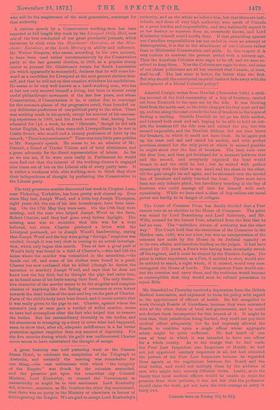A carious speech by a Conservative working-man has been reported
at full length this week by the Liverpool Daily Mail, now one of the best conducted of our great provincial journals, which threatens to rival even the Manchester Guardian, or the Man- chester Examiner, or the Leeds Mercury in ability and influence. Mr. Walter Simpson, who seems. according to his own account, to have been used rather unceremoniously by the Conservative party at the last general election, in 1868, as a popular stump orator to prevent Mr. Gladstone's return for South Lancashire .(in which apparently he succeeded), declares that he will come for- ward as a candidate for Liverpool at the next general election him- self, and that he will not on that occasion withdraw his candidature. He seems to be very well known as a hard-working man, who has at last not only secured himself a living, but been in almost every useful philanthropic movement of the last few years, and whose Conservatism, if Conservatism it be, is rather due to contempt for the common-places of the progressive creed, than founded on any deliberate preference of one political party to the other. There was nothing much in his speech, except his account of his canvass- ing experience in 1868, and his frank avowal that, having been educated for lid. a week, he was "illiterate," though he did talk better English, he said, than some rich Liverpudlians to be met in -Castle Street, who would end a clumsy profession of faith by the remark, "Them's my sentiments !" There was very little pure politics in Mr. Simpson's speech. He seems to be an admirer of Mr. Disraeli, a friend of Trades' Unions and of total abstinence, and a great advocate for the direct representation of labour. As far as we can see, if he were once really in Parliament he would soon find out that the interest of the working-classes is engaged nine times out of ten on the Liberal side of every party issue.. It is rather a weakness with able working-men to think they show their independence of thought by preferring the Conservative to he Liberal party.


































 Previous page
Previous page